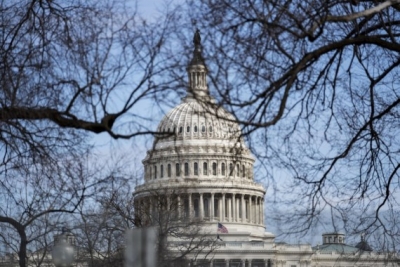US Senate clears procedural hurdle to raise debt ceiling
By IANS | Published: December 10, 2021 09:18 AM2021-12-10T09:18:35+5:302021-12-10T09:30:09+5:30
Washington, Dec 10 The US Senate has cleared a key procedural hurdle to raise the debt ceiling, paving ...

US Senate clears procedural hurdle to raise debt ceiling
Washington, Dec 10 The US Senate has cleared a key procedural hurdle to raise the debt ceiling, paving the way for it to approve the legislation by a simple majority vote.
On Thursday, all Democrats and 14 Republicans in the 50-50 split chamber voted in favour of the measure, which would allow Congress to increase the statutory borrowing limit by a set amount, reports Xinhua news agency.
Republicans previously refused to support Democrats' efforts to raise the debt ceiling, arguing that the latter should deal with the crisis on their own, since they control both chambers of Congress and the White House, while complaining about Democrats' lack of bipartisanship in crafting major spending bills.
After weeks of exchanging blames, lawmakers in October agreed to extend the debt ceiling through early December, temporarily staving off economic disaster.
The latest vote, which came after Republican leader Mitch McConnell reached a deal with Democrat leaders on the issue, broke months of impasse and would help avert a looming debt default.
"I cannot overstate how critical it is that Congress address this issue. America must pay its bills on time and in full. If we do not, we will eviscerate our current recovery," Treasury Secretary Janet Yellen told lawmakers last week.
"There is uncertainty about where we will be on December 15, and there are scenarios in which we can see it would not be possible to finance the government," she said.
Failure to pay the nation's bills on time could send immediate ripple effects throughout the global economy, particularly during a time of economic recovery and heightened uncertainty over a new Covid-19 variant, according to the Bipartisan Policy Center, a Washington, D.C.-based think tank.
The debt limit, commonly called the debt ceiling, is the total amount of money that the US government is authorized to borrow to meet its existing legal obligations, including social security and medicare benefits, interest on the national debt, and other payments.
Disclaimer: This post has been auto-published from an agency feed without any modifications to the text and has not been reviewed by an editor
Open in app